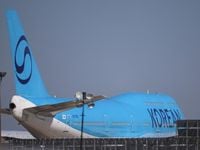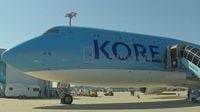In a dramatic turn of events that has rippled across diplomatic and business circles, more than 300 South Korean workers detained during a federal immigration raid at a Hyundai battery plant in Georgia have been released and are on their way home. The episode, which unfolded over the past week, has sparked outrage in South Korea and raised pressing questions about the future of Korean investment in the United States.
The saga began on September 4, 2025, when U.S. Immigration and Customs Enforcement (ICE) agents descended on the under-construction Hyundai battery factory west of Savannah, Georgia. According to federal officials, the raid targeted workers who had either entered the country illegally, overstayed their visas, or were in the U.S. on visa waivers that do not permit employment. The result: the arrest of more than 300 South Korean nationals, along with workers from China, Japan, and Indonesia. As reported by the Associated Press, a total of 330 people were detained—316 of them Koreans, 10 Chinese, three Japanese, and one Indonesian.
Video footage released by U.S. authorities showed some workers in chains, being led away from the facility. The images, widely broadcast in South Korea, ignited a wave of anger and what President Lee Jae-myung described as a "sense of betrayal." South Korea’s largest newspaper compared the operation to a "rabbit hunt," and lawmakers from both major parties called the detentions "outrageous and heavy-handed." The incident struck a particularly raw nerve, coming less than two weeks after a summit between U.S. President Donald Trump and President Lee, and just weeks after a July agreement in which South Korea pledged $350 billion in new U.S. investments in exchange for relief from steep American tariffs.
During a news conference marking his 100th day in office, President Lee did not hold back. "When you build a factory or install equipment at a factory, you need technicians, but the United States doesn’t have that workforce and yet they won’t issue visas to let our people stay and do the work," he said, as quoted by AP. "If that’s not possible, then establishing a local factory in the United States will either come with severe disadvantages or become very difficult for our companies. They will wonder whether they should even do it." Lee added, "It’s not like these are long-term workers. Our companies can’t help hesitating a lot about making direct investments in the U.S. under the current system."
South Korean officials have long pressed Washington to create a visa system that accommodates skilled Korean workers needed for launching and maintaining manufacturing sites. Currently, many companies rely on short-term visitor visas or the Electronic System for Travel Authorization (ESTA) to bring in specialists for setup tasks—a practice that, while previously tolerated, has now come under sharp scrutiny.
After the raid, South Korea’s Foreign Ministry confirmed that the 330 detainees were released overnight on September 10-11 and bused to Atlanta’s Hartsfield-Jackson International Airport. There, a government-chartered plane awaited to bring them home, with the flight scheduled to arrive in South Korea on September 12. The group’s departure had been delayed the previous day due to unspecified issues on the U.S. side, according to Fox 5 Atlanta.
The episode’s timing could hardly have been more sensitive. The arrests came just as the U.S. and South Korea were celebrating a landmark trade agreement, and as South Korean companies were investing heavily in American industrial projects. The Hyundai battery plant is one of over 20 major industrial sites South Korean firms are building in the U.S., including other battery factories in Georgia, a semiconductor plant in Texas, and a shipbuilding project in Philadelphia.
The public backlash in South Korea was swift and severe. President Lee described the raid as "bewildering" and pointed to "cultural differences" in how the two nations handle immigration. "In South Korea, we see Americans coming on tourist visas to teach English at private cram schools—they do it all the time, and we don’t think much of it, it’s just something you accept," Lee said, according to The Associated Press. "But the United States clearly doesn’t see things that way. On top of that, U.S. immigration authorities pledge to strictly forbid illegal immigration and employment and carry out deportations in various aggressive ways, and our people happened to be caught in one of those cases."
The incident also drew the attention of U.S. political leaders. Georgia Governor Brian Kemp emphasized that the situation should not overshadow decades of cooperation between Georgia and South Korea. Meanwhile, Hyundai and its partner LG face ongoing questions about possible labor violations at the site, even as they reaffirm their commitment to following all state and federal laws.
In the wake of the controversy, both nations have moved quickly to address the root cause: the visa system for foreign workers. Following a meeting in Washington between South Korean Foreign Minister Cho Hyun and U.S. Secretary of State Marco Rubio, the two sides agreed to set up a joint working group to discuss creating a new visa category that would make it easier for South Korean companies to send their staff to work in the United States. Minister Cho warned that unless the visa issue is resolved, more South Korean workers in the U.S. could be vulnerable to future crackdowns, though he acknowledged that Seoul does not yet have an estimate of how many might be at risk.
President Trump, for his part, reportedly delayed the workers’ flight back to South Korea on September 10, wanting some to remain and train American workers. Ultimately, only one worker opted to stay. Trump has publicly stated that while he welcomes foreign companies to "LEGALLY bring your very smart people, with great technical talent," he also wants a system where "our people can be trained so that they can do it themselves."
The economic stakes are high. As Min Jeonghun, a professor at South Korea’s National Diplomatic Academy, explained to AP, "Without an update in U.S. visa policies, Korean companies will no longer be able to send their workers to the United States, causing inevitable delays in the expansion of facilities and other production activities, and the harm will boomerang back to the U.S. economy." The two countries’ total trade volume reached $239.6 billion in 2024, underlining the deep interconnectedness of their economies.
As the released workers make their way home, the episode stands as a stark reminder of the challenges that can arise at the intersection of immigration policy, business interests, and international diplomacy. Whether the joint working group can forge a solution that satisfies both nations remains to be seen, but for now, the message from Seoul is clear: unless the visa system changes, the future of Korean investment in America may be on shaky ground.



